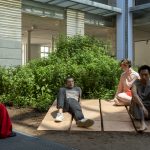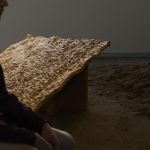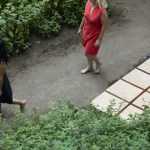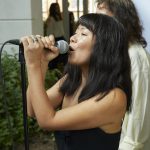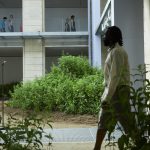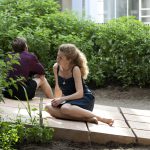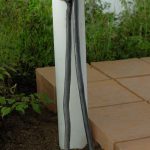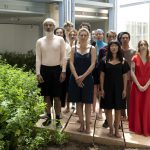An insight into Lina Lapelyte’s notes while working on the project “Mutes” at the ACT residency
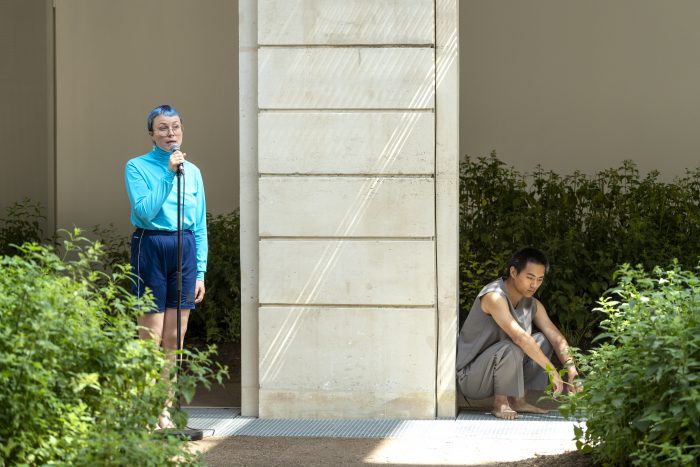
For the Art, Climate, Transition residency, I (Lina Lapelyte) continued development on ‘Study
for Slope’, also known as ‘The Mutes’. This is a durational musical performance
for a group of amateur singers lacking a ‘musical ear’. Therefore, they cannot
sing in tune.
Knowing and not knowing are similar starting points for me. This work is about
losing control. Perhaps calling the performers ‘singers’ is incorrect. Before this
performance, they were never allowed to sing, not being considered good enough
to correctly repeat a given tone or articulate a rhythm within a group. I’m trained as
a classical violinist, tonality was always essential. When I started making my own
performances, working with singers and performers whom I asked to sing, pitch
remained very important—how do I make the group sound in tune, and how does
this tuning become another layer of the conceptual framework, something that
brings the emotion in, the harmony, and the vibrations the harmony creates?
However, I realized that I was losing the opportunity to collaborate with people
who were not able to repeat specific harmonies, or lack a trained ear.
This gradually brought me to ‘The Mutes’, which completely overturns this precision
in tuning. I challenged myself to work with people who don’t have the training and
ability to connect through tuning. I’m interested in other kinds of relations, such
as the fragility of silenced voices. The core idea in ‘The Mutes’ is to challenge the
musical tradition that is based on tonality and take individual hearing as a starting
point. This is a metaphor for wider questions, such as how do we fit in if we cannot
harmonise with the rest of society? What is there that is left, how can these voices
still be heard?
I developed this work over several years, with special period of attention afforded by
support from the ACT residency. It started during the pandemic—I originally planned
to stage it at the Lilith Performance Studio in Malmö, then it grew into a sound
installation which I presented at Tai Kwun Contemporary in Hong Kong, and finally
as a live piece with local performers at Lafayette Anticipations in Paris.
Every piece teaches me something. Some especially remind me of the things I want
to unlearn. My collaborative opera works ‘Have a Good Day!’ and ‘Sun and Sea’
with Rugilė Barzdžiukaitė and Vaiva Grainytė, and solo projects like ‘Hunky Bluff’
and ‘Candy Shop’ are unified by music and singing though each one focuses on
different topics. My solo works are more conceptual, and the operas are much more
focused on verbal narratives.
For me the artwork is always something that sits within a specific architecture and
context. Making ‘Study for Slope/The Mutes’ with ACT’s support and the exhibition
venue in Paris was incredible, working with institutions that understand the artist
as a space-shifter. In the exhibition, the work both created its own environment
and also spread and integrated into the existing one.
In connection with ACT’s topic of social transition and broadening perspectives,
‘Study for Slope’ aims to open people up, while also opening spaces, inviting
the natural light in. Combined with the performers’ voices, the nettle garden is
an ever-changing, fragile organism, drawing attention to the delicate interaction
of people with their natural surroundings. Nettles are considered a sturdy,
tough plant, but they still require light and care.
Sculptural objects—ramps, shoes, canes, benches—surround the performers
and accompany the narrative. They are integral parts of the performance,
essential tools to deliver it.
I long had the idea of working with non-musical performers, and during that time,
completely by chance, I encountered Sean Ashton’s novel ‘Living in a Land’.
The book is a fictional memoir written in sentences composed of statements
as negatives. It depicts activities, habits, and thoughts conveying a sense
of belonging—to a certain time, a certain age and gender, a class, a culture—
and call upon our own experiences. It fit perfectly with the things I wanted to talk
about—the experience of not fitting in or the pressure to behave in a particular way.
‘Living in a Land’ talks about the things that we have all probably felt, done,
thought about, or experienced in our lives.
The group of performers recite the text from a first-person perspective,
appropriating the everyday activities and thoughts that Sean describes in the novel.
That text takes on different meanings when sung by a younger or older performer,
or perceived by someone younger or older. Some of my previous works,
like ‘Ladies’ or ‘Play for the Parallels’, also deal with conversations between
different generations, different voices, and shared perspectives. I am interested
in how individual narratives turn into collective voices. Singing in a group can be
an instrumental tool to deliver that message. Sean’s novel has a lot of irony and it is
also very English, which creates some fruitful tension outside Anglophone contexts.
Working with performers lacking a traditional ‘musical ear’ is a process of learning,
delving into the unknown, and developing a new language. In this context
my musical knowledge and training almost has no value, I myself feel
out of tune and have to think of a new methodology.
However, the emphasis is less on the result, but rather on discovery. The specificity
of music-making and that of a nettle—it might not feel very pleasant, but it reminds
us of our own bodily presence. Collaboration is also very important to me—some
of my works are purely collaborative. I share the authorship with other artists and
in some other works I take more of a lead. When I think of performers, they never
come as a blank page, they bring their own presence, their own thoughts, and that
makes the work happen. I often try to relinquish some of my control and allow the
circumstances to influence and change the work.
‘Study for Slope/The Mutes’ as staged in Paris took place over one month, exhibited
as a loop throughout each day the gallery was open.
Durational performance work gives more freedom to the audience— the audience
controls the outcome. ‘Sun & Sea’ at the Venice Biennale also ran in a loop,
but it was originally done as a one-hour event, therefore the narrative was
quite tightly constructed.
With ‘Study for Slope’, I thought of how space and time stretch throughout the day,
how the light or the intensity of the audience changes. The month of repetition
might change how the performers relate to and deliver the material, however it is
not trying to make them better singers. Hopefully, it will make us better listeners.
‘Study for Slope/The Mutes’ at Lafayette Anticipations, Paris, 2022
photos Marc Domage
“ACT: Art. Climate. Transition” is co-financed by the EU’s programme “Creative Europe”. ACT is a European cooperation project on ecology, climate change and social transition. In an era of climate breakdown, mass extinction and growing inequalities we join our forces in a project on hope: connecting broad perspectives with specific, localised possibilities, ones that invite or demand that we act. ACT is a project initiated by 10 cultural operators from 10 European countries, working in the field of performing and visual arts. More about the project read at artclimatetransition.eu.


Back

